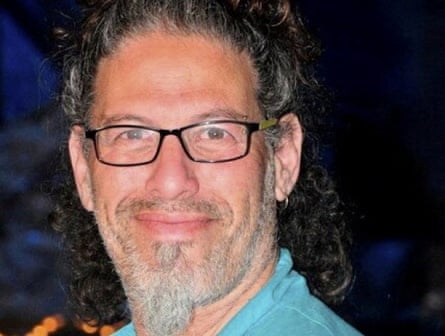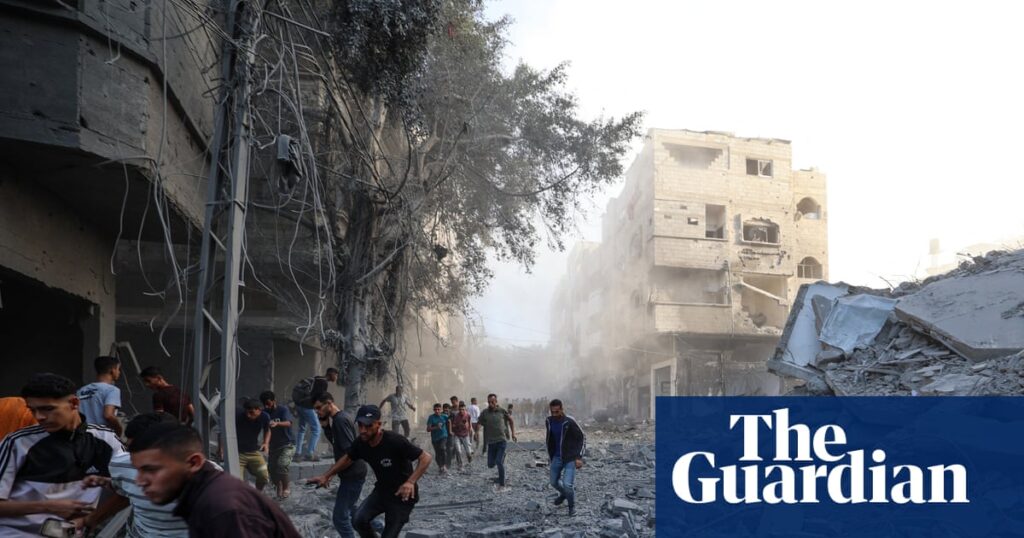Israel launched waves of lethal airstrikes on Sunday and cut off all aid into Gaza “until further notice” after a reported attack by Hamas, in escalations that marked the most serious threat so far to the increasingly fragile ceasefire in the devastated territory.
Two Israeli soldiers, including an officer, were killed in the Hamas attack. Palestinian officials said dozens died in the retaliatory airstrikes.
A senior Egyptian official said “round-the-clock” contacts were under way to de-escalate the situation as regional powers scramble to shore up the ceasefire, though hopes rose that a complete collapse could be avoided when both Hamas and the Israeli military issued statements saying they were committed to the agreement.
Senior US officials, possibly including the vice president, JD Vance, were expected to arrive in Israel in the coming days for what observers said was a clear effort to hold Benjamin Netanyahu, Israel’s prime minister, to the deal signed in Sharm-el-Sheikh earlier this month.
Even before Sunday’s violence, tensions had been running high in recent days with a dispute between Hamas and Israel over the return of the remains of 28 deceased hostages held by the militant Islamist group. Israel has said Hamas is delaying the return of some hostages’ remains in violation of the ceasefire deal.
Palestinian officials in Gaza accused Israel on Saturday of violating the ceasefire 48 times and killing dozens of Palestinians since the deal brokered by Trump was signed 10 days ago.
There was no official confirmation from Israel of the move to suspend all aid, which was widely reported in Israeli media as well as by international news agencies citing security officials. Earlier on Sunday, Israel announced that the crucial Rafah crossing with Egypt would remain shut “until further notice”. Moves to delay the opening of Rafah last week prompted widespread international condemnation.
The deal signed last week between Israel and Hamas raised hopes of an improvement in the acute humanitarian crisis in Gaza. A surge of aid was one of the key elements of the 20-point deal brokered by Donald Trump.
The new Israeli restrictions will mean renewed suffering for many in Gaza, where famine was declared in parts in August. Fuel and medical supplies are also desperately scarce, particularly in the north, where destruction is most severe.
The Israeli military said its strikes into Gaza came after Hamas attacked Israeli troops “operating to dismantle terrorist infrastructure” in the southern city of Rafah. Maj Yaniv Kula, 26, and Staff Sgt Itay Yavetz, 21, “fell during combat in the southern Gaza Strip” the military said, the first Israeli fatalities since the ceasefire took effect on 10 October.
Israeli planes then began targeting what it said were tunnel shafts and military infrastructure in the area and also launched strikes in the northern town of Beit Lahia.
In a statement, Netanyahu’s office said he had directed the military to take “strong action” against any ceasefire violations but did not threaten an immediate return to war – as demanded by his far-right allies in the ruling coalition.
On Sunday evening an Israeli security official told Channel 12, an Israeli TV network, that Israel “did not want to bring down the ceasefire” and implied that Israel was aware that some Hamas militants were operating without orders from commanders.
Later, a military spokesperson said that Israeli forces, “following a series of significant strikes in response to Hamas’s violations”, had “begun the renewed enforcement of the ceasefire”.
Among targets hit by Israel on Sunday was a makeshift coffeehouse on the coastal side of al-Zawaida town in central Gaza, where six Palestinians were killed, while two people were killed near the Al-Ahli soccer club in the Nuseirat refugee camp by a second strike, Palestinian officials in Gaza said. Awda hospital, which received the casualties, said the attack in Nuseirat also wounded eight.
A third strike hit a tent in the Muwasi area of Khan Younis in the south, killing at least one person, according to Nasser hospital.
Gaza’s civil defence agency said the strikes killed at least 33 people on Sunday. There was no independent confirmation of the claim.
Izzat al-Risheq, a senior Hamas official, said the militant group remained committed to the ceasefire despite the reported clashes in Rafah with Israel forces. “It is the occupation that continues to violate the ceasefire and provide excuses for its crimes,” he said.
Hamas said its communication with its remaining units in Rafah had been cut off for months and “we are not responsible for any incidents occurring in those areas”. A delegation from the organisation arrived in Cairo on Sunday to being talks over the second phase of ceasefire negotiations.
The ceasefire deal also stipulated that all Israeli hostages, living and dead, would be returned and nearly 2,000 Palestinian detainees and prisoners freed. Last Monday Hamas returned the last 20 surviving hostages but as of Saturday evening had returned the remains of only 12 of the 28 deceased captives, saying it would need specialist recovery equipment to retrieve the rest from the ruins of Gaza.
Hamas says the war’s devastation and Israeli military control of areas of Gaza have slowed the handover. Israel believes Hamas has access to more bodies than it has returned.
On Saturday night, Hamas returned two caskets, which were identified by forensic doctors as containing the remains of Ronen Engel, a 54-year-old photographer who was killed on 7 October in a kibbutz in southern Israel and whose remains were taken to Gaza, and Sonthaya Oakkharasr, a Thai national who was killed in the Be’eri kibbutz.
Engel was a photojournalist and volunteer ambulance driver for Magen David Adom. His death was confirmed in December 2023. His wife, Karina, and two daughters, Mika and Yuval, were also kidnapped but were returned during a deal in November 2023.

On Saturday night, the US state department said there were “credible reports” that Hamas would violate the ceasefire, saying a “planned attack against Palestinian civilians would constitute a direct and grave violation of the ceasefire agreement”. If such an attack took place, it said, “measures will be taken to protect the people of Gaza and preserve the integrity of the ceasefire”.
The US statement was understood to be referring to Hamas’s crackdown on clans that are opposed to its rule, many of which are backed and armed by Israel. Videos circulated last week of Hamas carrying out public executions of clan members.
As part of the ceasefire agreement, Israel on Saturday returned 15 bodies of Palestinians to Gaza, bringing the total it has returned to 135. However, they have been returned with no names, only numbers.
Meanwhile, Gaza’s ruins were being scoured for the dead. Newly recovered bodies brought the Palestinian death toll above 68,000, according to the health ministry. Thousands of people are still missing, according to the Red Cross. About 1,200 died in the Hamas raid into Israeli in October 2023 that triggered the war, and 251 were abducted.
With Associated Press and Agence France-Presse

